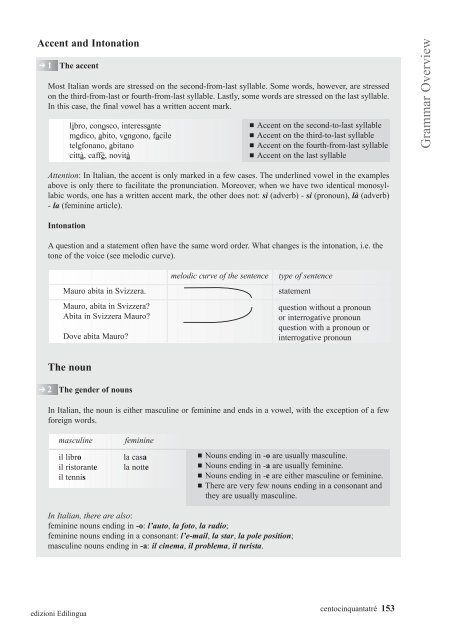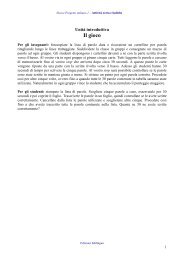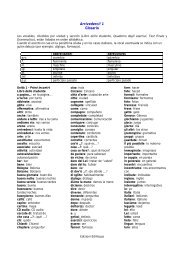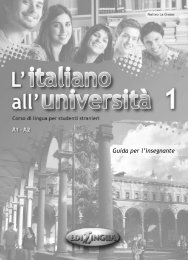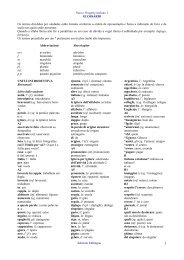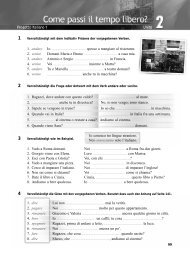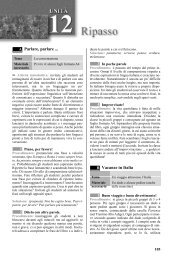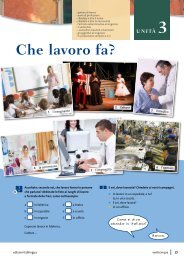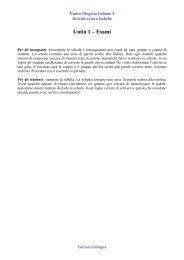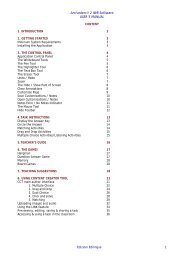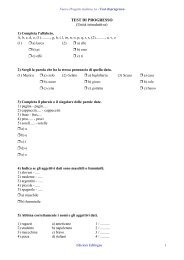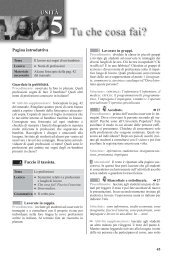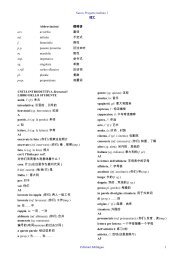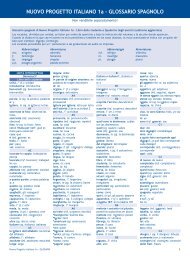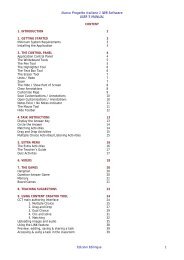You also want an ePaper? Increase the reach of your titles
YUMPU automatically turns print PDFs into web optimized ePapers that Google loves.
Accent and Intonation<br />
➔ 1 The accent<br />
Most Italian words are stressed on the second-from-last syllable. Some words, however, are stressed<br />
on the third-from-last or fourth-from-last syllable. Lastly, some words are stressed on the last syllable.<br />
In this case, the final vowel has a written accent mark.<br />
libro, conosco, interessante<br />
medico, abito, vengono, facile<br />
telefonano, abitano<br />
città, caffè, novità<br />
■ Accent on the second-to-last syllable<br />
■ Accent on the third-to-last syllable<br />
■ Accent on the fourth-from-last syllable<br />
■ Accent on the last syllable<br />
<strong>Grammar</strong> <strong>Overview</strong><br />
Attention: In Italian, the accent is only marked in a few cases. The underlined vowel in the examples<br />
above is only there to facilitate the pronunciation. Moreover, when we have two identical monosyllabic<br />
words, one has a written accent mark, the other does not: sì (adverb) - si (pronoun), là (adverb)<br />
- la (feminine article).<br />
Intonation<br />
A question and a statement often have the same word order. What changes is the intonation, i.e. the<br />
tone of the voice (see melodic curve).<br />
Mauro abita in Svizzera.<br />
Mauro, abita in Svizzera?<br />
Abita in Svizzera Mauro?<br />
Dove abita Mauro?<br />
melodic curve of the sentence<br />
type of sentence<br />
statement<br />
question without a pronoun<br />
or interrogative pronoun<br />
question with a pronoun or<br />
interrogative pronoun<br />
The noun<br />
➔ 2 The gender of nouns<br />
In Italian, the noun is either masculine or feminine and ends in a vowel, with the exception of a few<br />
foreign words.<br />
masculine<br />
il libro<br />
il ristorante<br />
il tennis<br />
feminine<br />
la casa<br />
la notte<br />
■ Nouns ending in -o are usually masculine.<br />
■ Nouns ending in -a are usually feminine.<br />
■ Nouns ending in -e are either masculine or feminine.<br />
■ There are very few nouns ending in a consonant and<br />
they are usually masculine.<br />
In Italian, there are also:<br />
feminine nouns ending in -o: l’auto, la foto, la radio;<br />
feminine nouns ending in a consonant: l’e-mail, la star, la pole position;<br />
masculine nouns ending in -a: il cinema, il problema, il turista.<br />
edizioni <strong>Edilingua</strong><br />
centocinquantatré 153
➔ 3<br />
Names of professions<br />
Some names of professions have different endings for the feminine or masculine gender.<br />
Some others instead, have the same ending for both genders.<br />
masculine<br />
l’impiegato<br />
l’infermiere<br />
lo studente<br />
il dottore<br />
il programmatore<br />
il tassista<br />
l’insegnante<br />
il cliente<br />
il francese<br />
feminine<br />
l’impiegata<br />
l’infermiera<br />
la studentessa<br />
la dottoressa<br />
la programmatrice<br />
la tassista<br />
l’insegnante<br />
la cliente<br />
la francese<br />
■ Most masculine names of professions<br />
ending in -o and -e will end in -a in the<br />
feminine form.<br />
■ Some masculine names in -e end in -essa<br />
in the feminine.<br />
■ Masculine nouns ending in -tore will end<br />
in -trice in the feminine.<br />
■ Masculine nouns ending in -ista, -ante,<br />
and -ese do not usually change in the<br />
feminine.<br />
Attention:<br />
■ For the professions medico, ingegnere and architetto, there is only the masculine form, used to refer<br />
to women as well:<br />
Maria fa il medico.<br />
La signora Brunetti è un buon ingegnere.<br />
Mia moglie è architetto.<br />
■ When the nouns ingegnere, dottore and professore are followed by the name of a person, they lose<br />
the last vowel (from -re to -r):<br />
L’ingegner Gambini abita a Firenze.<br />
Le presento il dottor Franchi.<br />
Di dov’è il professor Pancheri?<br />
■ The noun signore, when followed by the name of a person, also loses the last vowel (from -re to -<br />
r). The noun signora instead, is often used alone:<br />
Buongiorno, signor Fabiani.<br />
But: Mi dica, signora!<br />
➔ 4<br />
Singular and Plural<br />
singular plural<br />
il libro i libri o Î i<br />
il ristorante i ristoranti<br />
la notte le notti<br />
e Î i<br />
la casa le case a Î e<br />
il bar<br />
i bar<br />
la città le città<br />
■ Nouns ending in -o or in -e usually form<br />
the plural in -i.<br />
■ Nouns ending in -a usually end in -e in<br />
the plural.<br />
■ Nouns ending in a consonant or with a<br />
written accent mark on the final vowel<br />
do not change in the plural.<br />
Some nouns are almost always used in the singular form or the plural form.<br />
In the singular only: la gente, il coraggio, il pepe and others.<br />
In the plural only: i pantaloni, le ferie, i soldi, gli spinaci and others.<br />
154 centocinquantaquattro<br />
That’s Allegro
Peculiarities in the formation of the plural<br />
singular<br />
plural<br />
il problema i problemi a Î i<br />
il negozio i negozi io Î i<br />
lo zio gli zii io Î ii<br />
il tedesco i tedeschi co Î chi<br />
l’albergo gli alberghi go Î ghi<br />
l’amica le amiche ca Î che<br />
la bottega le botteghe ga Î ghe<br />
il medico i medici co Î ci<br />
l’arancia le arance cia Î ce<br />
la spiaggia le spiagge gia Î ge<br />
la camicia le camicie cia Î cie<br />
la farmacia le farmacie cia Î cie<br />
■ Masculine nouns ending in -a end in -i in the plural.<br />
■ Nouns that end in -io in the singular (atone i) end<br />
in -i in the plural.<br />
■ Nouns that end in -io in the singular (tonic i), end<br />
in -ii in the plural.<br />
■ With nouns ending in -co, -go, -ca and -ga, you<br />
insert an h in the plural to preserve the [k] or the<br />
[g] sounds.<br />
■ Masculine nouns ending in -co, end in -ci in the<br />
plural if they have an accent on the third-from-last<br />
syllable. l’amico - gli amici is an exception.<br />
■ Nouns ending in -cia/-gia end in -ce/-ge in the<br />
plural when there is a consonant before the letters<br />
c and g. They end in -cie/-gie when there is a<br />
vowel before the letters c and g or when the i has<br />
a written accent mark.<br />
<strong>Grammar</strong> <strong>Overview</strong><br />
Some nouns have an irregular form in the plural: la moglie - le mogli, l'uomo - gli uomini.<br />
The article<br />
➔ 5<br />
Definite and indefinite articles<br />
masculine<br />
before a word beginning with a consonant<br />
before a word beginning with a vowel<br />
before a word beginning with s + consonant<br />
before a word beginning with z, gn, y, ps<br />
feminine<br />
before a word beginning with a consonant<br />
before a word beginning with a vowel<br />
Indefinite article<br />
Definite article<br />
singular plural<br />
un libro il libro i libri<br />
un amico l’amico gli amici<br />
uno studente lo studente gli studenti<br />
uno zio lo zio gli zii<br />
una casa la casa le case<br />
un’amica l’amica le amiche<br />
■ Nouns with the beginning sound gn, y and ps: gli gnocchi, lo yoga, lo psicologo.<br />
➔ 6<br />
Use of the definite article<br />
Le presento la signora Rossi.<br />
Il signor Gambini oggi non viene.<br />
Il dottor Rivelli è di Torino.<br />
But: Buongiorno, signor Rossi.<br />
In Italian, we use the definite article with:<br />
■ signore/signora + name of person;<br />
■ professional title + name of person (see also Point 3 -<br />
Names of professions). When we talk directly to someone,<br />
we do not use the article;<br />
edizioni <strong>Edilingua</strong><br />
centocinquantacinque 155


